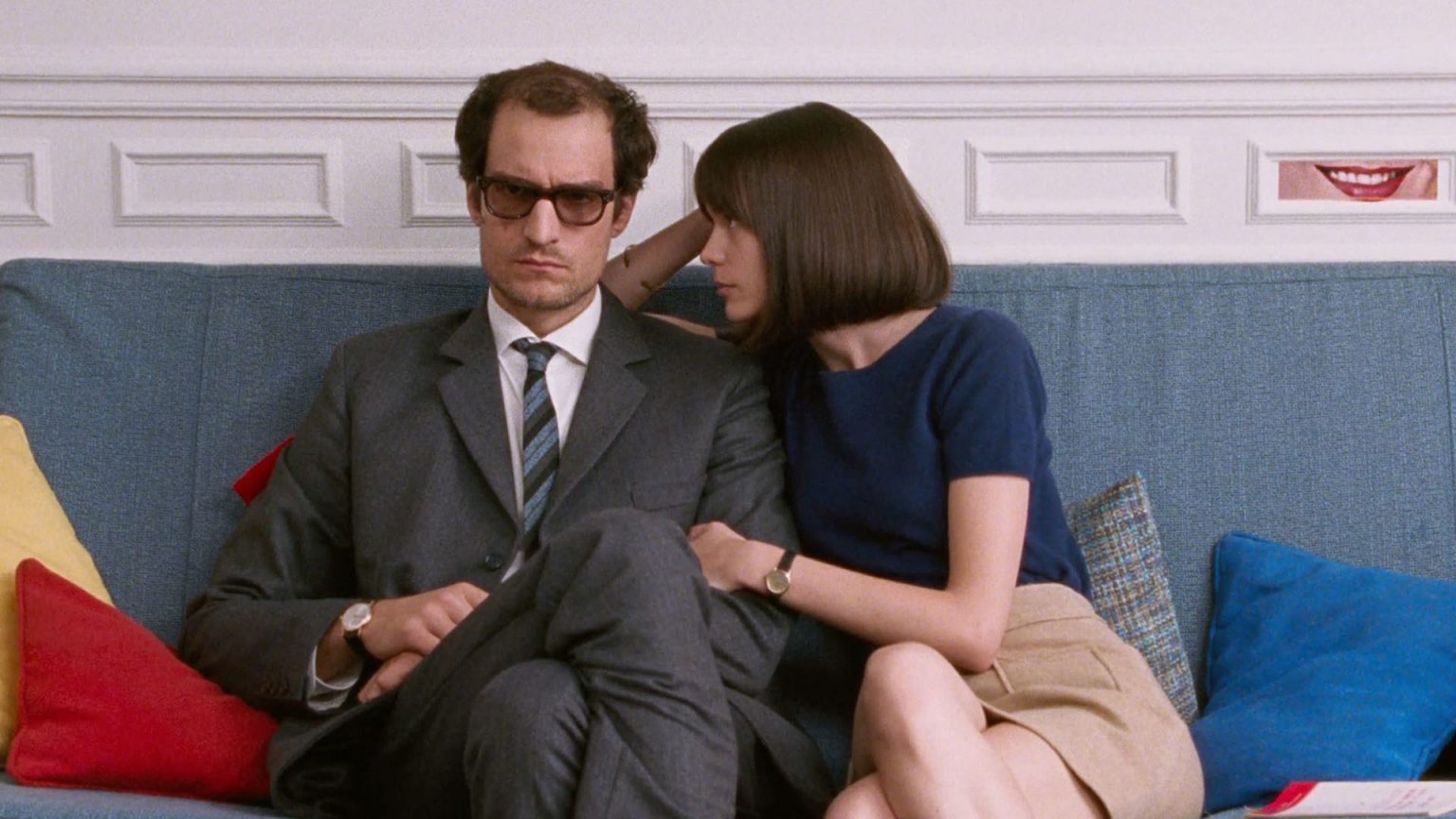After premiering at the 2017 Cannes Film Festival, writer/director Michel Hazanavicius’ new film, Godard Mon Amour, has finally made its way stateside. Whether you love the movies of Jean-Luc Godard or not, there’s no denying Hazanavicius’ talent. The multi-hyphenate filmmaker won the Academy Award for Best Directing for The Artist. And, here at Fandor, we’re especially big fans of his OSS 117 series, a hilarious send-up of the James Bond-style of spy film. His newest movie is a clever, somewhat light-hearted take on Godard’s move away from narrative cinema and his romance with Anne Wiazemsky. Fandor staffers Levi Hill and Joaquin Lowe sat down to discuss what they thought about the movie.
Levi Hill: As someone who was forced to study Godard in film school, but also, generally loves (most of) Godard’s films, I was really excited for the possibility of Hazanavicius bringing some clever and inventive visual humor to Godard’s early career. In fact, when it was announced at Cannes last year, I jumped the gun and predicted Louis Garrel, who plays Godard, would win the Prix d’interprétation masculine (Best Actor) at Cannes. After watching the film, I still think Garrel is great. The rest? Not so much.
Joaquin Lowe: Interesting, I had a similar feeling watching the movie—that both of the leads, Garrel and Stacy Martin, who plays Anne Wiazemsky, were both great. Surprisingly, I thought that it was the directing that let the movie down. What do you think of Hazanavicius’ work on the film?
LH: I agree about Stacy Martin. After this, and Von Trier’s Nymphomaniac, I’m convinced she’s an excellent actress who deserves better material. About Hazanavicius, I think he starts out of the gate strong. There are some sly visual references that are clearly meant to honor the work of Godard: Breaking of the 4th wall, the chapters segmenting the film, and the classic breaking of the “180-degree rule.” But midway through the film, it feels as though Hazanavicius isn’t really searching for any sort of deeper rumination on cinema, love, politics, or art—despite the character of Godard openly questioning and probing each of these things within the film. It felt like superficial admiration, rather than someone who truly understood what made Godard’s films so revered.
JL: I felt like it was a good effort on Hazanavicius’ part, but I suspect that he was caught between two opposing desires he had for the film—The first was to have fun with Godard’s film style (and to keep the tone of the movie light and fun by being referential). The second was to tell the true story of an imperfect love affair. The problem for me was that the tone of the love affair grew increasingly heavy, even as Hazanavicius kept his film “trickery” light. This, for me, led to a disagreement in tone between the story and the directing, which really hurt the movie for me.
LH: I agree. Had the film committed to honoring Godard’s film style as a visually experimental comedy, instead of being tethered to the eventual end of a relationship between two talented artists, there could have been more leeway with Hazanavicius’ desire to play with narrative and expectations. Most of the film is about Godard’s attempts to break free from narrative cinema, and Godard Mon Amour is at its most fun when it’s replicating this. Instead, Hazanavicius takes a more traditional biopic route, but in doing that, when he gets playful it feels disjointed from the rather bland by-the-book telling of Godard’s failed relationship and search for something deeper than narrative cinema. For those who have watched and thoroughly enjoyed Hazanavicius’ The Artist and the OSS 117 series, he surely could have gone the more comedic and experimental route.
JL: Okay, so where does this movie stand for you? For me, I thought it was a fine movie, with some genuine “wow” moments (and, though we didn’t get into this too much, really great cinematography) that were unfortunately too few and far between to invite future re-watching. Garrel and Martin were both great, but all I could think of during the second half of the movie, which does drag a bit too long, was to plead for Wiazemsky (Martin) to get out of that relationship, which was, for lack of a more nuanced description, straight-up emotionally abusive. And, unfortunately for Hazanavicius, it’s hard to tell the light and breezy story I think he wanted to tell when the subject matter is about emotional abuse.
LH: I think you captured the best way to talk about the film as a whole: “It was fine.”




